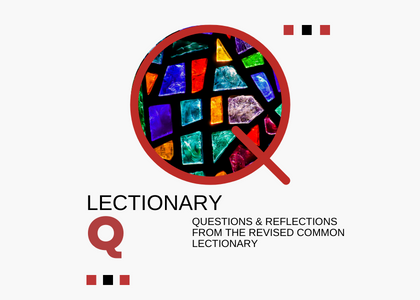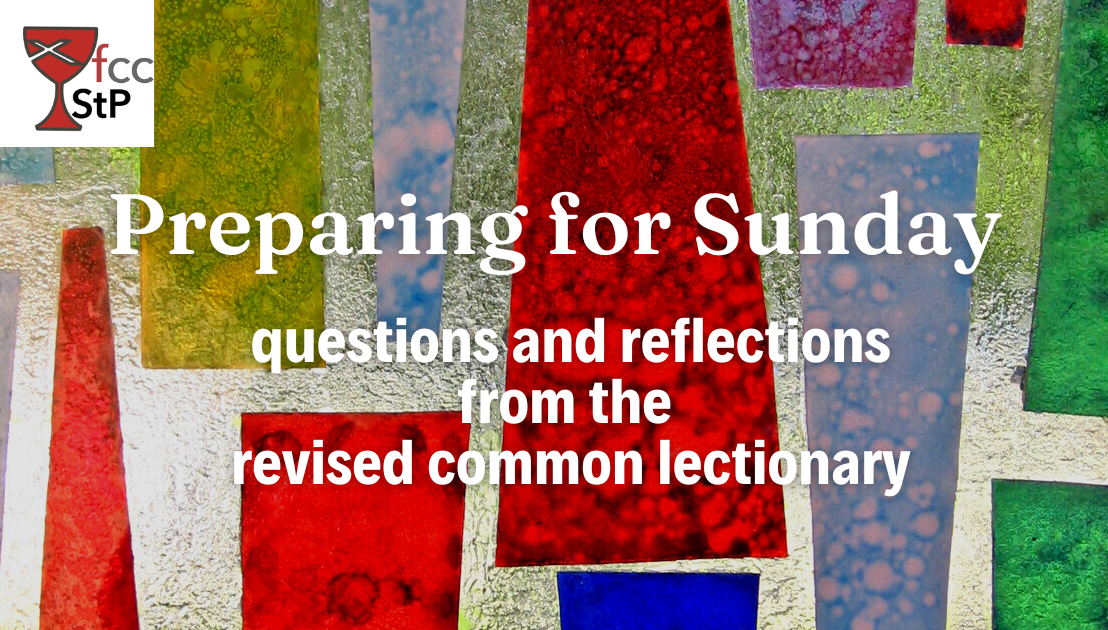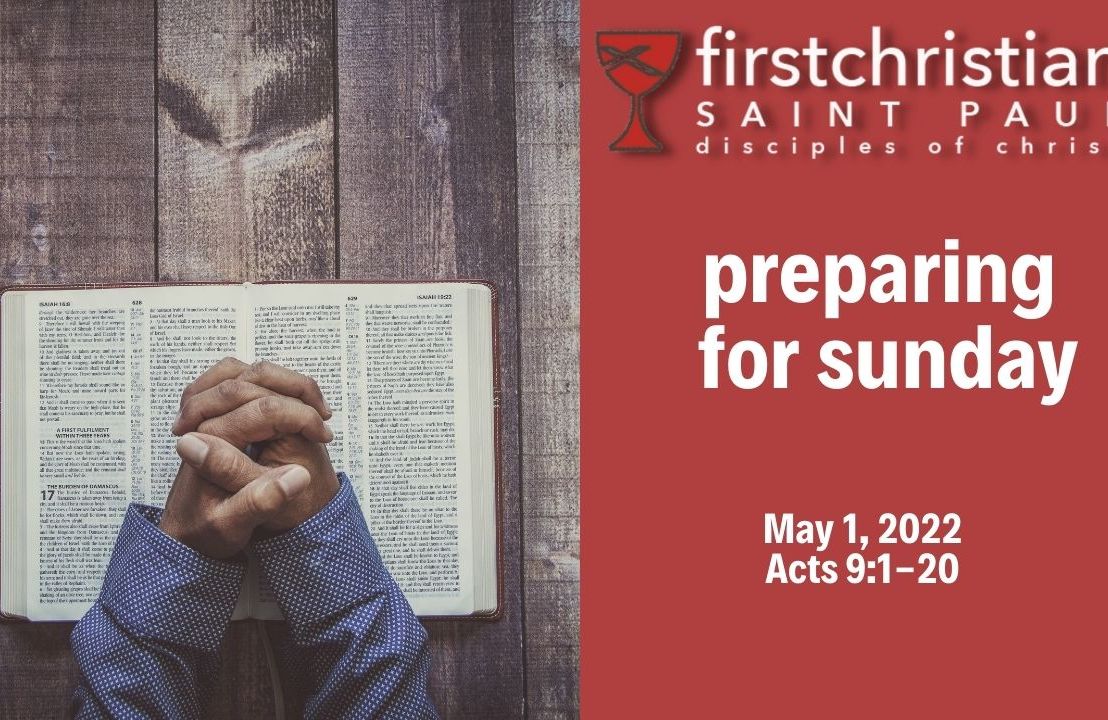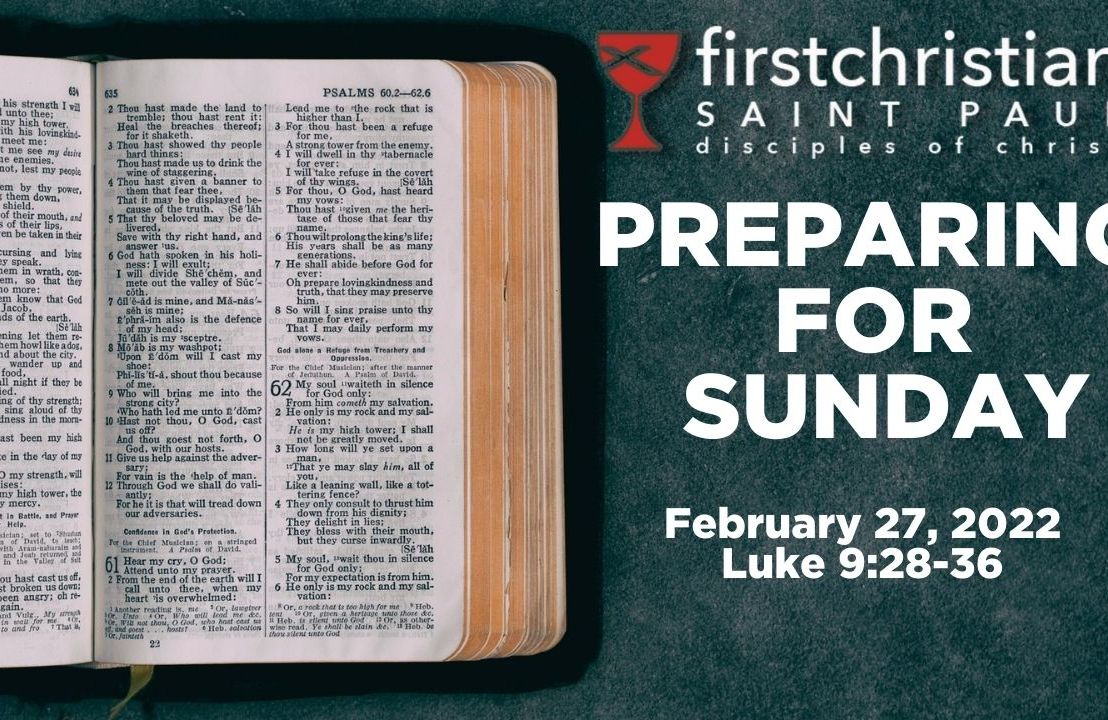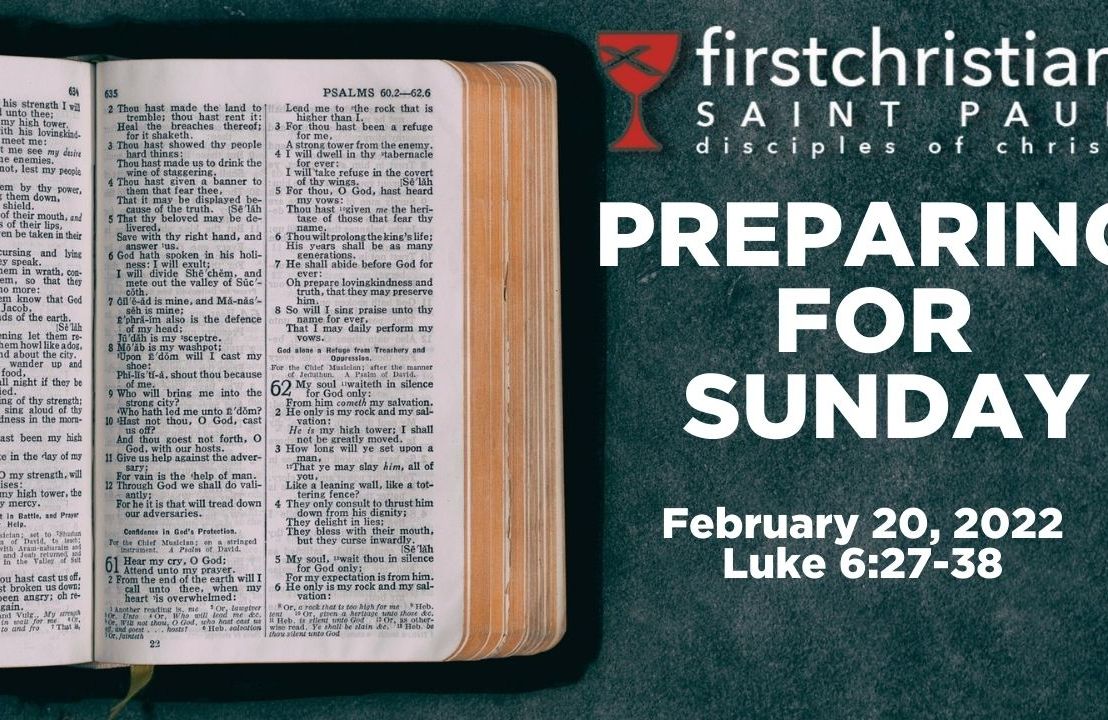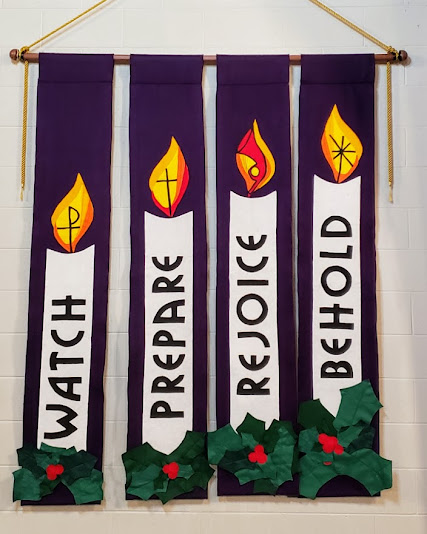Lectionary Q is a resource for clergy and the laity to get ready for the upcoming Sunday using a text from the Revised Common Lectionary. This week’s text is from Jeremiah 31:27-34 and Luke 18:1-8.
Category: revised common lectionary
Preparing for Sunday: September 11, 2022
Fourteenth Sunday After Pentecost
Preparing for Sunday is a weekly time to prepare for Sunday worship. Based on the Revised Common Lectionary, Preparing for Sunday is a time to step away from the busyness of the world and reflect on what God is saying to us.
This week’s text is from Luke 15:1-10.
Do you have questions or answers to the questions? Leave them in the comments.
Here are some questions to think about the text:
-
Think about a time when you were lost. How did you feel? How did you feel when you were found?
-
Think about a time when you lost something. It could have been a person or something that means a lot to you. How did that feel? What did it mean when you finally found this thing or person that was lost?
-
Why do you think Jesus says twice that there is more rejoicing over the one sinner who repents over those who don’t repent?
-
Who are the sinners and tax collectors? Why do you think they come to Jesus? Who are the tax collectors and sinners in your life?
-
Why were the religious leaders so offended? How do you think they treated the tax collectors and sinners?
-
Who is lost in this passage, the sinners or the religious leaders or both?
What are your answers? What are your questions? Feel free to share them by responding to this post in the comments section or sending an email to info@fccsaintpaul.org.
Preparing for Sunday: May 1, 2022
Third Sunday of Easter
Preparing for Sunday is a weekly time to prepare for Sunday worship. Based on the Revised Common Lectionary, Preparing for Sunday is a time to step away from the busyness of the world and reflect on what God is saying to us.
This week’s text is from Acts 9:1-20.
Do you have questions or answers to the questions? Leave them in the comments.
Here are some questions to think about the text:
- Was Saul’s experience one of conversion or a call to ministry?
- Why do you think the other people with Saul never heard the voice Saul heard?
- Ananias had his concerns about healing Saul. Was Ananias right to ask these questions to God?
- In his discussion with Ananias God calls Saul an instrument to the Gentiles. God was using Saul to bring the good news to Gentiles. What does it mean to be an instrument of God?
- Does it matter that Ananias said he was sent to heal Saul? How is this an example of discipleship?
- What does it mean after his healing that Saul went to proclaim in the synagogue?
What are your answers? What are your questions? Feel free to share them by responding to this post in the comments section or sending an email to info@fccsaintpaul.org.
Preparing for Sunday: March 27, 2022
Preparing for Sunday is a weekly time to prepare for Sunday worship. Based on the Revised Common Lectionary, Preparing for Sunday is a time to step away from the busyness of the world and reflect on what God is saying to us.
This week’s text is from Luke 15:1-3 and 11-32.
Do you have questions or answers to the questions? Leave them in the comments.
Here are some questions to think about the text:
1. Of the three characters in this story, which one do you identify with more, the younger son, the older son or the father?
2. Who is the “prodigal” in this story; the younger son or the father?
3. Are grace and forgiveness fair? Why or why not?
4. Was the older son mad at his brother or his father?
5. Did the father extend grace to both sons? If so, in what ways did he show that grace?
6. Has there been a time when you were forgiven for something? How did that feel?
What are your answers? What are your questions? Feel free to share them by responding to this post in the comments section or sending an email to info@fccsaintpaul.org.
Preparing for Sunday: March 6, 2022
Preparing for Sunday is a resource for clergy and the laity to get ready for the upcoming Sunday using a text from the Revised Common Lectionary. This week’s text is from Luke 4:1-13.
Do you have questions or answers to the questions? Leave them in the comments.
Here are some questions to think about the text:
- The temptation of Jesus is found in the three Synoptic Gospels (Matthew 4:1-11 and Mark 1:12-13). Read the other versions. What is similar in all three stories? What’s different?
- The passage tells us that it is the Spirit that leads Jesus into the desert. Theologian Justo Gonzalez says that “Even while the devil is tempting Jesus, it is God who is ultimately in control, and it is God who not only allows but causes Jesus to be tempted.” Do you agree that God is allowing Jesus to be tempted? Why or why not?
- What is the significance of Jesus being tempted? Does that make him any less the Son of God?
- Theologian Fred Craddock says that good can be found within temptation. He says the devil doesn’t say, “Do you wish to be as the devil?” but, “Do you wish to be as God?” Do you agree or not? How do you see temptation?
- Think of a time when you were tempted? How was it similar to Jesus in the desert? How was it different? How did it change your faith?
What are your answers? What are your questions? Feel free to share them by responding to this post in the comments section or sending an email to info@fccsaintpaul.org.
Preparing for Sunday: February 27, 2022
Preparing for Sunday is a resource for clergy and the laity to get ready for the upcoming Sunday using a text from the Revised Common Lectionary. This week’s text is from Luke 9:28-36.
Do you have questions or answers to the questions? Leave them in the comments.
Here are some questions to think about the text:
- After reading the passage for this week, read the following: Luke 9:23-27. In what ways do these two passages connect?
- Read Exodus 24:12-18. How are these two stories similar? How are they different? How do they ultimately connect?
- Jesus talks to Moses and Elijah about what was going to happen to him in Jerusalem. The word used to describe his death is the world “exodus.” This is the same word that describes the Israelites leaving Egypt. How is Jesus’ upcoming death like the Jews fleeing the Pharaoh?
- Luke is the only gospel that connects the story to prayer. Why is that important?
- What was the reason behind Peter’s talk about building three monuments for the occasion?
- What is the significance of the voice?
What are your answers? What are your questions? Feel free to share them by responding to this post in the comments section or sending an email to info@fccsaintpaul.org.
Preparing for Sunday: February 20, 2022
Preparing for Sunday is a resource for clergy and the laity to get ready for the upcoming Sunday using a text from the Revised Common Lectionary. This week’s text is from Luke 6:27-38.
Do you have questions or answers to the questions? Leave them in the comments.
1. Is love just a feeling, or is it also action?
2. In verse 31 Jesus says the following: “Do to others as you would have them do to you.” This is commonly known as the Golden Rule. What do you think this means to you?
3. Who is an enemy as found in verse 29? What does it mean to love an enemy? How did Christ love his enemies? Is it possible for us to love our enemies?
4. What does it mean to show mercy to people? Can you think of a time mercy was shown to you?
5. What does loving our enemies or giving with no expectations have to do with God’s generosity?
What are your answers? What are your questions? Feel free to share them by responding to this post in the comments section or sending an email to info@fccsaintpaul.org.
Chosen for Adoption in God’s Family – Lectionary Reflection for Christmas 2C (Ephesians 1)
 |
Ephesians 1:3-14 New Revised Standard Version
3 Blessed be the God and Father of our Lord Jesus Christ, who has blessed us in Christ with every spiritual blessing in the heavenly places, 4 just as he chose us in Christ before the foundation of the world to be holy and blameless before him in love. 5 He destined us for adoption as his children through Jesus Christ, according to the good pleasure of his will, 6 to the praise of his glorious grace that he freely bestowed on us in the Beloved. 7 In him we have redemption through his blood, the forgiveness of our trespasses, according to the riches of his grace 8 that he lavished on us. With all wisdom and insight 9 he has made known to us the mystery of his will, according to his good pleasure that he set forth in Christ, 10 as a plan for the fullness of time, to gather up all things in him, things in heaven and things on earth. 11 In Christ we have also obtained an inheritance, having been destined according to the purpose of him who accomplishes all things according to his counsel and will, 12 so that we, who were the first to set our hope on Christ, might live for the praise of his glory. 13 In him you also, when you had heard the word of truth, the gospel of your salvation, and had believed in him, were marked with the seal of the promised Holy Spirit; 14 this is the pledge of our inheritance toward redemption as God’s own people, to the praise of his glory.
********
A new year begins. As I write this reflection on the reading for the Second Sunday after Christmas, we’re approaching the completion of our second year under the influence of the COVID-19 pandemic, and the end seems as far out of sight as ever. Much has happened over the course of the past few years that is disheartening. Hope is in short supply. But as a new year begins and we spend one last Sunday observing Christmas, we open up this second reading for the day and hear a reminder that God
has chosen us for adoption. Is this not good news? Does this not provide a word of hope as we move forward?
This letter, according to its opening greeting, was written by Paul to the church in Ephesus. Now, there are plenty of questions about authorship when it comes to the Ephesian letter. You can find my take on the matter in Participatory Study Guide on Ephesians (pp. 2-8). There are reasons for and against Pauline authorship, but for our purposes, I’m going to leave it open and simply refer to the author as Paul.
After offering the greeting in verses 1-2, Paul offers a call to worship: “Blessed be the God and Father of our Lord Jesus Christ, who has blessed us in Christ with every spiritual blessing in the heavenly places” (vs. 3). Yes, blessed be the God and Father of our Lord Jesus who has blessed us not just with a few blessings, but every spiritual blessing. The foundation of these blessings is our status as having been chosen by God in Christ. If the primary audience is composed of relatively new Gentile Christians, this is a word of assurance. Just as God has chosen Israel, so God chooses to adopt Gentiles into the family.
Having chosen us in Christ, we are to therefore conduct ourselves as people who are “holy and blameless in love.” When did God choose us in Christ? According to Paul, the election took place before the foundation of the world. So, what does Paul mean by this? Did God write a script before creation took place so that every action and reaction that has taken place since has been scripted? We do what the script says. It’s possible that Paul meant such a vision, but I’m not so sure. If that is the way things work, then surely, we can’t be held responsible for what happens in our lives. Every act of violence and natural disaster; it is just part of the script, isn’t it? Wars and disease. They are just part of the plan, are they not? I don’t know about you, but that doesn’t sound very appealing. It seems as if, if that is true, then we’re simply puppets whose strings are pulled by God. Thus, little or no room is for freedom and responsibility. Now, Paul could affirm that premise, but I’m not sure he does.
Our problem in reading this passage is that we tend to read Scripture in very individualistic terms. So, if God destines us for adoption, then do I have a choice in the matter? But, what if it’s not my personal status that is in question here, but the means by which God chooses to adopt us and the purpose of our adoption? Thus, the God who destined Jesus to be the one through whom God adopts us into the family of God, which is the church. Secondly, God chose us from before the foundation of the world to be holy and blameless in love. If we read it this way, we can also read it eschatologically. What Paul is focused on here is God’s ultimate purpose, which God will bring to fruition. That hope is that all of God’s creation would experience adoption in Christ. This is our destiny. Now, do we have a choice in this? I believe we do, but I also believe God will leave no stone unturned until God achieves the restoration of all things.
As I reflect on this passage, I believe the future is open. That is, I don’t believe that God has a script with every step along the way detailed. However, God is not without a plan, even if it can and will be altered along the way. I like to think here in terms of a GPS that recalculates when a change is made. It’s not a perfect analogy, but it might help us think about how God has in mind an ultimate destination but understands that time and pathway are always changing and thus requires adaption.
So back to Ephesians and God has predetermined, which is our redemption, the message then is that God has made a way for us to be redeemed. That means is through the blood of Jesus so that our trespasses might be forgiven. That, according to grace. Paul doesn’t say how the blood of Jesus is the means of our redemption, only that it is. Therefore, God has made known to us God’s will set forth in Christ so that in the fullness of time all things will be gathered up in him, both things in heaven and on earth (Eph. 1:10). Here is where I want to stop for a moment. Paul speaks here of the restoration of all things. It is the mystery of God’s will but it looks forward to that moment, whenever that moment takes place, God gathers everything up and redeems it bringing to a conclusion that which is so that something new will emerge. What does that mean for us? Does this speak of universal salvation, what the eastern church speaks of as apokatastasis? I would suggest it does. The future is still open, but the promise is that
God will, as intended, conclude with the restoration of all things. That seems to mean some form of universal salvation.
With this promise that all things will be redeemed comes another, and that has to do with the inheritance. As adopted members of the family, we are also heirs of the promise. Therefore, having been destined for this purpose we can “set our hope on Christ” and live for the praise of his glory” (Eph. 1:11-12). With this purpose set forth, we hear that having believed, we have also been marked by the seal of the Holy Spirit (vs. 13). This must mean, having been baptized, we have the assurance of our place in the redeemed community of the church. So, having been marked by baptism, which is the pledge of our inheritance, we can now live as God’s people, for the glory of God. Therefore, we can worship God, as the people of God, adopted, through Christ our Lord.
Time to Rejoice – Lectionary Reflection for Advent 3C (Philippians 4)
Philippians 4:4-7 (8-9) New Revised Standard Version
4 Rejoice in the Lord always. I will say it again: Rejoice! 5 Let your gentleness be evident to all. The Lord is near. 6 Do not be anxious about anything, but in every situation, by prayer and petition, with thanksgiving, present your requests to God. 7 And the peace of God, which transcends all understanding, will guard your hearts and your minds in Christ Jesus.
8 Finally, brothers and sisters, whatever is true, whatever is noble, whatever is right, whatever is pure, whatever is lovely, whatever is admirable—if anything is excellent or praiseworthy—think about such things. 9 Whatever you have learned or received or heard from me, or seen in me—put it into practice. And the God of peace will be with you.
********
The four Sundays of Advent are driven by four themes—hope, peace, joy, and love. We light candles to highlight each of these four themes. The candles might be blue or purple, depending on the color scheme we choose. On the third Sunday, this Sunday, however, we light a pink candle. Why do we light a pink candle on this particular Sunday? What does pink have to do with the day we light the candle of joy? Well, here’s the reason. The purple (or blue) is seen as a more somber color that signifies repentance, which is part of the path of preparation for welcoming the birth of the Christ child. The choice of pink here softens the image as a way of acknowledging that joy is breaking through the more somber days of Advent. Since we light the candle of joy, what better scripture text to hear on a day like this than the passage from Philippians 4.
Whatever is happening around us, Paul calls for us to “rejoice in the Lord, always.” Yes, rejoice always, not just when we feel in a happy mood. Indeed, joy is not the same as happiness. Remember that Paul writes this letter not from a beach in Hawaii, but a jail cell in some undisclosed location. When Paul writes here about joy, he’s not suggesting that joy depends on our circumstances in life. Joy is rooted in relationships with God and with the community of followers of Jesus.
While Paul seems to have a deep and abiding friendship with the people in Philippi, which is the cause of his joy, it’s not as if this is a perfect congregation without problems or concerns. It might not be the Corinthian or Galatian congregations, but it’s not a perfect place (as if such a thing exists). Consider the word given to the congregation to encourage his former co-workers, Euodia and Syntyche, to get along. That will occur if they are of one mind in the Lord. The reason he wants to encourage the healing of the relationship is that these two women have been important partners in his ministry (Phil. 4:2-3). How often in churches do we find key members, who have had an important ministry, get cross-ways undermining their message. Thus, Paul wants them to reconcile so they can focus their attention on the ministry of the congregation.
Ultimately it is because the Lord is near that he has reason to be joyful. While that word has eschatological implications, it could also speak to Paul’s sense that God is present with him by the Spirit. This relationship with God, therefore, makes it possible to rejoice always. In fact, he tells the Philippians in this paragraph of the letter not to be anxious about anything. That’s, of course, easier to say than to do. Many of us live anxiety-filled lives. We worry about our health, the health of our family members, the situation in our nation and our communities. There is so much stuff going on in our lives that it’s difficult not to feel a bit anxious. You’d have to be a Vulcan not to feel anxiety in this day and age. So, how can Paul say to us don’t worry, be happy? Well, he doesn’t say that exactly. He simply says, don’t be anxious. Instead, pray. Again, it’s important to remember that Paul is writing this letter from a jail cell, so we can’t really dismiss this word as little more than pious claptrap. He knows what it means to live his life amid difficult circumstances. Nevertheless, he believes it’s possible for those who are people of God to experience joy, no matter the circumstances. That suggests that joy is something that is rooted in God’s presence in our lives.
I’m going to pick up on a word here that can be read in different ways. Paul writes to them, noting that “the Lord is near.” That can be read apocalyptically. We can think here in terms of Paul’s expectation that Jesus’ return in glory was near at hand. That is a message we find throughout Paul’s letters. He’s not, necessarily, a millennialist. That is, he doesn’t have a position on whether Jesus will return at some point to reign on earth for a thousand years (Rev. 20:4-6). That’s not part of his message. He does, however, believe that the last day, the day of the Lord, was near at hand. So, we can read it in this way. For our purposes, however, I’d like to read it in a more spiritual manner, in a way that someone like Origen or maybe St. Augustine would appreciate.
If we read it in a more spiritual manner, we can embrace the idea that no matter where we are or situation in life, the “Lord is near.” That is, we’re not alone as we take this journey of life. That is why we can live through difficult times without anxiety. It is the relationship that we experience with God, that sustains us, and brings us joy. It’s this relationship that is embodied by his connection with the congregation that sustains him. This suggests that the community is important to the life of faith.
People will ask whether one can be a Christian without being part of a church. Now there is a theology that suggests there is no salvation outside the church. The point of that message is a sacramental one. It is in the church that one receives the sacraments of baptism and the Lord’s Supper. I believe that these sacramental moments are important contributors to the Christian life and that they are made available in the context of the church, but that’s not what I have in mind here. It is the relationship that exists when we are in community that provides a space where God draws near to us. As Jesus said, “when two or three are gathered in my name, I am there among them” (Matt 18:20). This is the key to our ability to live lives of joy.
Now, the reading designated by the Revised Common Lectionary for the third Sunday of Advent is centered on verses 4-7 of Philippians 4. I’ve chosen to include in this reflection verses eight and nine. They seem to belong to what Paul writes in verses 4-7. These verses help focus our attention on what it means to live a joy-filled life. The key here is keeping our minds focused on the right things. That is, things that are noble and pure, lovely and admirable. Yes, keep your minds focused on praise-worthy things. When we keep focused on the things of God then the peace of God, which surpasses all understanding can guard our hearts and mind. That comes through Christ Jesus.
Since the Advent season has an eschatological dimension, we should keep our eyes on that word about Christ drawing near. That word reminds us that the day of the Lord is out there ahead of us. But there is no need to fear if one keeps one’s eyes on the prize. And, as we see here in this letter, Paul is committed to making sure this congregation is ready for that day. This message fits well with the message we find in the reading for today from the Gospel of Luke. In the reading from Luke 3, John the Baptist preaches a message of repentance and offers a baptism that will prepare the people to receive the coming Messiah. John is not the Messiah. He is only the one who prepares the way (Luke 3:7-18). Paul is not the Messiah, but he also is called upon by God to prepare the way for others to encounter the peace of God that comes to us through Christ. The final word of this reading, which is found in verse 9, is simply a word of encouragement. “Keep on doing the things that you have learned and received and heard and seen in me, and the God of peace will be with you.” Follow the way of Jesus, which involves love overflowing so we might know what is best so that on the day of the Lord we’ll be ready with a harvest of righteousness (Phil. 1:9-11). Then, we will break out in joyful song, singing “Joy to the world, the Lord is Come! Let earth receive her King!; let every heart prepare him room, and heaven and nature sing!” Yes,”Joy to the world, the Savior reigns!”
Hebrews 9:24-28 New Revised Standard Version
24 For Christ did not enter a sanctuary made by human hands, a mere copy of the true one, but he entered into heaven itself, now to appear in the presence of God on our behalf. 25 Nor was it to offer himself again and again, as the high priest enters the Holy Place year after year with blood that is not his own; 26 for then he would have had to suffer again and again since the foundation of the world. But as it is, he has appeared once for all at the end of the age to remove sin by the sacrifice of himself. 27 And just as it is appointed for mortals to die once, and after that the judgment, 28 so Christ, having been offered once to bear the sins of many, will appear a second time, not to deal with sin, but to save those who are eagerly waiting for him.
****
Like much of the New Testament, the Book of Hebrews has a strong apocalyptic element. We see that apocalyptic dimension present here in this passage. Because of how apocalyptic messages have been used over the centuries and especially over the past several decades, there is general discomfort with the apocalyptic dimension of the New Testament. It’s understandable. However, it’s there for all to see. We can’t ignore it. Besides the apocalyptic elements of the New Testament provide a certain intensity and alertness to the texts. It brings to the fore a certain anticipation that something is about to happen. Granted, we live two millennia later and, as of yet, Jesus hasn’t returned. That is why theologians such as Origen and Augustine allegorized texts like this. In fact, one scholar spoke of Origen demythologizing the apocalyptic elements. There is reason to do so. At the same time, it’s important that we not ignore the message even if we must reinterpret it.
First-century Christians expected Jesus to return at any moment. At times Paul encouraged such thinking and at other times he had to calm the folks down, reminding them that in the meantime they needed to attend to business. That is, go to work so you can eat. That being said, the author of Hebrews, whose identity remains unknown, offers us a meditation on the apocalyptic dimension of Jesus’ ministry.
As noted in a previous reflection, Hebrews represents a Platonized vision of the ministry of Jesus. He contrasts the earthly ministry of the Levitical priesthood with Jesus’ heavenly priesthood. Whereas the Levitical priests had to annually offer sacrifices on behalf of not only the general populace but themselves as well. In our reading, which continues the messaging we’ve been hearing, Jesus enters the heavenly Temple ready to offer a sacrifice for sin. The sacrifice he offers is himself. Nothing is said here of the cross upon which Jesus died but is rather an offering of himself to God as a replacement for the annual sacrifices. That is, the author of Hebrews focuses on the sacrifices offered on the Day of Atonement and not Passover. While we know from Scripture (Leviticus 16) what this involves, the nature of the sacrifice on Jesus’ part is not revealed. In other words, the cross is not specifically mentioned.
The apocalyptic element is clear in the statement that Jesus has appeared “at the end of the age to remove sin by the sacrifice of himself.” The way it is phrased here, Jesus has already done this, suggesting that the “end of the age” has already occurred, and that it occurred when Jesus offered himself in the heavenly Temple in the presence of God on our behalf. In doing this, Jesus acted to remove sin from us. As noted elsewhere in Hebrews, Jesus does this only once and not annually as was true of the Levitical priests. As we’ve seen earlier, Jesus takes his priesthood from the mysterious line of the priest-king Melchizedek (Heb. 7).
The reading suggests that the end of the age began when Jesus offered himself up as the atoning sacrifice in the heavenly temple. In other words, what happened on earth with the crucifixion also happened in heaven as Jesus entered the heavenly Temple and offered himself up to God as an atoning sacrifice. This is the word Hebrews offers concerning the first advent, but there is a second as well. Some use the analogy of D-Day for understanding the cross. While the war would continue for almost a year in Europe, once the allies landed in Normandy the war was won. There would be no turning back. With that analogy as a reference to the cross, Jesus gained a beachhead that would never be turned back. There would be many more battles to come. Evil hasn’t given up its resistance, but it will not win. Even for those of us who believe that the future is open and unwritten, could we not say that Good Friday and Easter turned the tide?
Hebrews acknowledges that we all die once, and then comes the day of judgment. What this means is not clear, though Jürgen Moltmann cautions those of us who lean toward universal salvation,
If salvation is tied to faith, then all the universal statements in the New Testament must be related to God’s good salvific intention, but not to the outcome of history. What is meant is the possibility of redemption, not its inevitable actuality. It is true that the word aionios does not mean the absolute eternity of God, but it does mean the irrevocability of the decision for faith or unbelief. Faith’s experience that in the presence of the call to decision one is standing before God has as its corollary the finality of human decision. Consequently `the double outcome’ is the last word of the Last Judgment. [Moltmann. The Coming of God: Christian Eschatology (Kindle Locations 3506-3509). Kindle Edition].
That is good to remember—the outcome is not inevitable. We have choices and redemption can’t be coerced if God is truly love.
When it comes to the timing of this day of judgment, it does sound here as if it immediately follows death. Other passages of Scripture suggest a different timeframe, so unless we embrace a God who stands outside time (timeless) then we have some interpretive moves to make here. Whatever the time frame, the story is not yet complete. There is also a second coming. But unlike the first advent, in which Christ dealt with sin (apparently through his death on the cross) this second advent is designed to save the faithful who are eagerly awaiting Jesus’ return.
Hebrews doesn’t reveal exactly what is meant by the word “save,” but it would seem that the expectation is that Jesus will return to gather up the faithful bringing this age to a close. Judgment has already occurred, so the expectation is not one of fear but hope. Thus, salvation in this context is not related to deliverance from sin, but a gathering up of those whom Jesus has already saved. Tom Long puts it this way concerning the anticipated day of judgment:
In this part of the passage, the writer of Hebrews indicates that the offering of Christ makes this obsession with judgment moot. In Christ, sin has already been extinguished, and lasting forgiveness has been granted. So Christians do not have to dread the future, watching fearfully for God the judge. God’s future is one of salvation and redemption. Christ is “coming again,” not with a sword of judgment, but “to save those who are eagerly waiting for him.” [Long, Feasting on the Word, p.
283].
So, instead of putting up signs that call for people to get right with God, in Christ, we are already made right with God. So, we can focus on other things. Judgment day is not a day to be feared but celebrated. So keep alert, the day of the Lord is near at hand!! Maranatha! Lord Come Quickly!
| Image attribution: Icon of the Second Coming, from Art in the Christian Tradition, a project of the Vanderbilt Divinity Library, Nashville, TN. https://diglib.library.vanderbilt.edu/act-imagelink.pl?RC=56666 [retrieved October 31, 2021]. Original source: https://commons.wikimedia.org/wiki/File:Icon_second_coming.jpg. |

